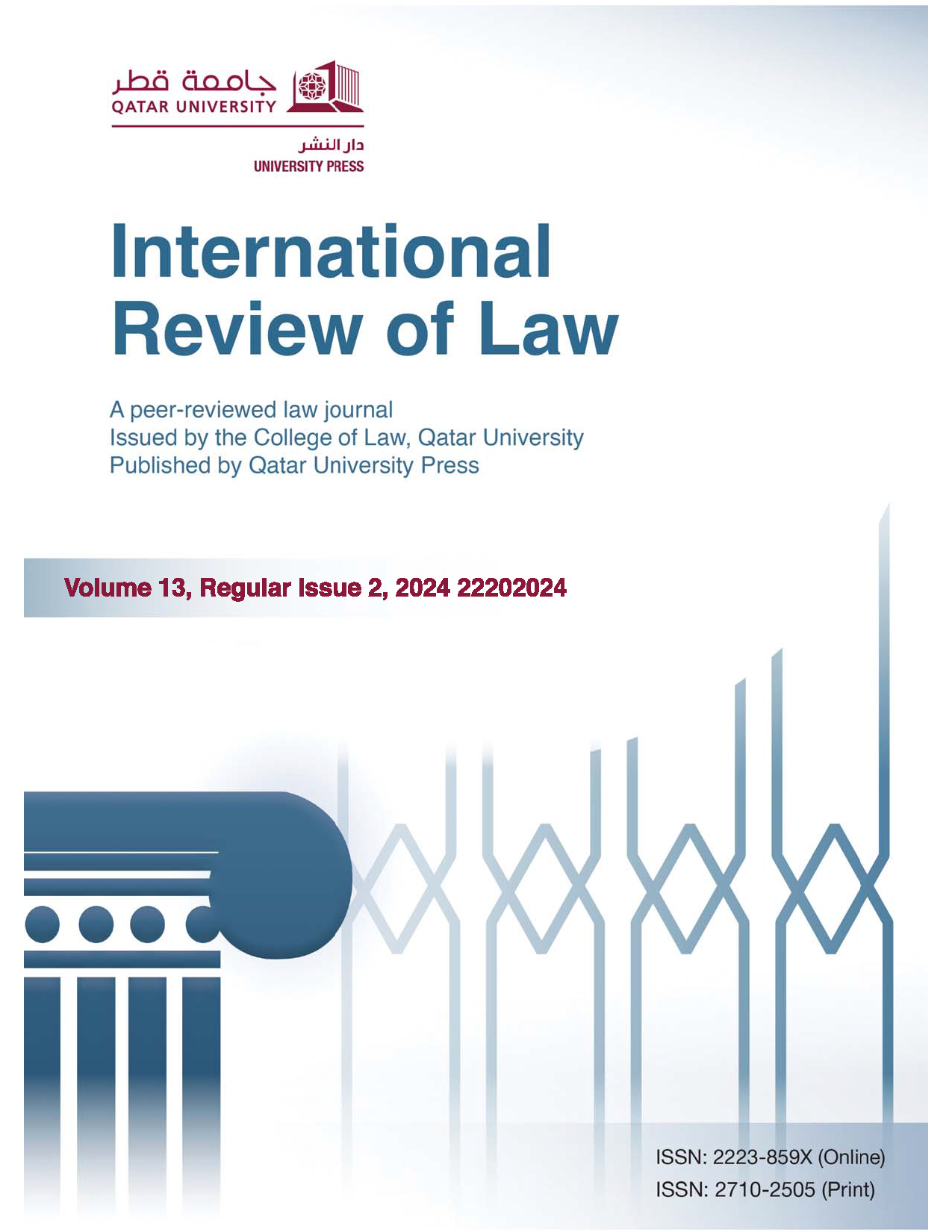Judicial Review of Congressional Power to Tax under U.S. Constitution: Tensions between Framers’ Intent and Imperatives of Reality
Abstract
This paper discusses authority granted to Congress over imposing federal taxes in general, and income tax in specific. The author used the critical analytical method to analyze the rulings of the U.S. Supreme Court, the U.S. Income Tax Law, and the U.S. Constitution, to reach the policy followed by the court in ruling on the constitutionality of legal provisions related to the constitutionality of such tax legislations. The importance of this article comes in that it is one of the few studies that analyzed and criticized the policy of the U.S. Supreme Court in its ruling on the constitutionality of tax federal legislations. The author explains the role of the U.S. Supreme Court in identifying what is considered as income in some gray areas that the U.S. tax code (26 U.S. Code of 1986) did not provide an answer for, or petitioners claimed that such income does not fall in gross income inclusions. In addition, the author explains the philosophy behind granting Congress such power, and the effects of such authority. Although the author believes that many amendments to the tax code has political backgrounds rather than economic, granting this power to Congress would be less arbitrary compared to the political scenarios that could appear if it granted to the Executive Branch. At last, the author discusses the constitutional limits on congressional power of taxing and how these limits would affect tax legislations that Congress was trying to pass, considering people’s right of equity in tax treatment under Uniformity Clause.
Metrics
##plugins.themes.bootstrap3.article.details##
Separation of PowersTaxing PowerTaxation ClausesTaxable IncomeChecks and Balances
1 Stephens, Otis H. Jr. & Scheb Ii, John M. American Constitutional Law (4th ed. 2008).
Araiza, William D. Constitutional Law (2nd ed. 2021).
Chemerinsky, Erwin. Constitutional Law (6th ed. 2020).
Fisher, Louis & Harriger, Katy J., American Constitutional Law 744 (12th ed. 2019).
Freeland, James J. et al., Fundamentals of Federal Income Taxation 93 (17th ed. 2013).
II. Articles
BALL, MILAN N. CONGRESSIONAL RESEARCH SERVICE, THE FEDERAL TAXING POWER: A PRIMER 13 (2020).
Jensen, Erik M. The Export Clause, 6 FLA. TAX REV. 1, 3 (2003).
–––. The Taxing Power, the Sixteenth Amendment, and the Meaning of “Incomes,” 33 Ariz. L.J. 1057 (2001).
Kelly, Claire R. & Amzel, Daniela. Does the Commerce Clause Eclipse the Export Clause: Making Sense of United States v. United States Shoe Corp., 84 MINN. L. REV. 129, 145 (1999).
Lund, Nelson. The Uniformity Clause, 51 Chi. L. Rev. 1193 (1984).
LUNDER, ERIKA K. CONGRESSIONAL RESEARCH SERVICE, EXPORT CLAUSE: LIMITATION ON CONGRESS’S TAXING POWER 1-2 (2012).
Simon, Karla W. Congress and Taxes: A Separation of Powers Analysis, 45 U. of MIAMI L. REV. 1005 (1991).
III. Legislations
Constitution of the United States.
26 U.S. Code of 1986.
IV. Caselaw
A.G. Spalding & Bros. v. Edwards, 262 U.S. 66 (1923).
A.L.A. Schechter Poultry Corp. v. United States, 295 U.S. 495 (1935).
Bailey v. Drexel Furniture Co., 259 U.S. 20 (1922).
Baker v. Carr, 369 U.S. 186 (1962).
Cesarini v. U.S., 296 F.Supp. 3 (D. Ohio 1969).
Commissioner v. Glenshaw Glass Co., 348 U.S. 426 (1955).
Edye v. Robertson, 112 U.S. 580 (1884).
Fairbank v. U.S., 181 U.S. 283 (1901).
Flast v. Cohen 392 U.S. 83 (1968).
Gitlitz v. C.I.R., 531 U.S. 206, 212 (2001).
Haig v. Agee 453 U.S. 280 (1981).
Hampton v. United States, 276 U.S. 394 (1928).
Lyeth v. Hoey, 305 U.S. 188 (1938).
McCulloch v. Maryland, 17 U.S. 316 (1819).
Millard v. Roberts, 202 U.S. 429 (1906).
National Federation of Independent Business v. Sebelius, 567 U.S. 519 (2012).
New York Trust Co. v. Eisner, 256 U.S. 345 (1921).
Old Colony Trust Co. v. Commissioner of Internal Revenue, 279 U.S. 716 (1929).
Pace v. Burgess, 92 U.S. 372 (1875).
Pennhurst State School and Hospital v. Halderman 451 U.S. 1 (1981).
Pollock v. Farmers' Loan & Trust Co, 157 U.S. 429 (1895).
Regan v. Wald, 468 U.S. 222 (1984).
Sanford’s Estate v. Commissioner of Internal Revenue, 308 U.S. 39 (1939).
Sonzinsky v. U.S., 300 U.S. 506 (1937).
South Dakota v. Dole, 483 U.S. 203 (1987).
U.S. v. Butler 297 U.S. 1 (1936).
U.S. v. Hvoslef, 237 U.S. 1 (1915).
U.S. v. International Business Machines Corp., 517 U.S. 843, 861 (1996).
U.S. v. Munoz-Flores, 495 U.S. 385 (1990).
U.S. v. Ptasynski, 462 U.S. 74 (1983).
U.S. v. U.S. Shoe Corp., 523 U.S. 360 (1998).
V. Websites:
Biden to Include Minimum Tax on Billionaires in Budget Proposal, N.Y. TIMES (Mar. 26, 2022, 7:30 PM), https://www.nytimes.com/2022/03/26/us/politics/biden-billionaires-minimum-tax.html?smid=fb-nytimes&smtyp=cur&fbclid=IwAR0cI1XxR0IUeK3QszAy-Bx9fOfVq2X3l6DyidntZNMfeYtUEK0V7vjs9dc
Joseph L. Story, Commentaries on the Constitution of the United States § 871 (1833). Available on: https://lonang.com/library/reference/story-commentaries-us-constitution/sto-313


